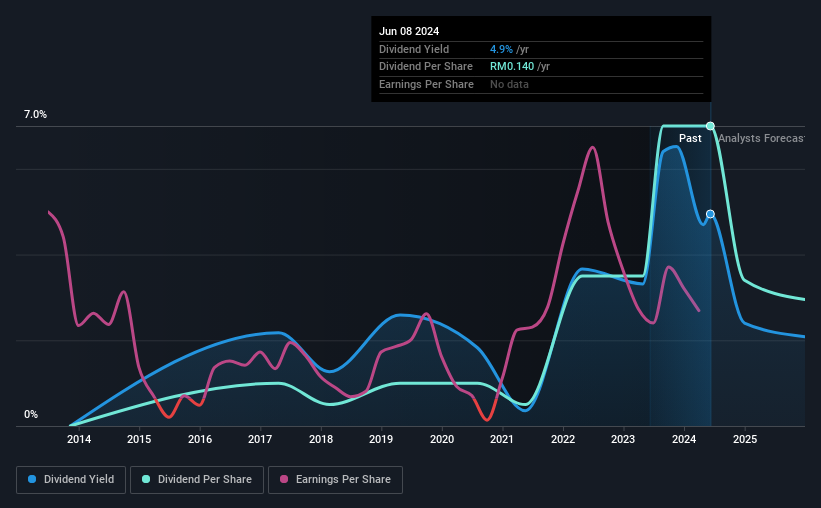Malaysia Smelting Corporation Berhad (KLSE:MSC) Will Pay A RM00.07 Dividend In Three Days
Malaysia Smelting Corporation Berhad (KLSE:MSC) is about to trade ex-dividend in the next three days. The ex-dividend date is usually set to be one business day before the record date which is the cut-off date on which you must be present on the company's books as a shareholder in order to receive the dividend. It is important to be aware of the ex-dividend date because any trade on the stock needs to have been settled on or before the record date. Thus, you can purchase Malaysia Smelting Corporation Berhad's shares before the 13th of June in order to receive the dividend, which the company will pay on the 28th of June.
The company's next dividend payment will be RM00.07 per share, on the back of last year when the company paid a total of RM0.14 to shareholders. Looking at the last 12 months of distributions, Malaysia Smelting Corporation Berhad has a trailing yield of approximately 4.9% on its current stock price of RM02.83. Dividends are an important source of income to many shareholders, but the health of the business is crucial to maintaining those dividends. So we need to investigate whether Malaysia Smelting Corporation Berhad can afford its dividend, and if the dividend could grow.
View our latest analysis for Malaysia Smelting Corporation Berhad
If a company pays out more in dividends than it earned, then the dividend might become unsustainable - hardly an ideal situation. It paid out 87% of its earnings as dividends last year, which is not unreasonable, but limits reinvestment in the business and leaves the dividend vulnerable to a business downturn. We'd be concerned if earnings began to decline. That said, even highly profitable companies sometimes might not generate enough cash to pay the dividend, which is why we should always check if the dividend is covered by cash flow. Dividends consumed 61% of the company's free cash flow last year, which is within a normal range for most dividend-paying organisations.
It's encouraging to see that the dividend is covered by both profit and cash flow. This generally suggests the dividend is sustainable, as long as earnings don't drop precipitously.
Click here to see the company's payout ratio, plus analyst estimates of its future dividends.
Have Earnings And Dividends Been Growing?
Stocks in companies that generate sustainable earnings growth often make the best dividend prospects, as it is easier to lift the dividend when earnings are rising. Investors love dividends, so if earnings fall and the dividend is reduced, expect a stock to be sold off heavily at the same time. Fortunately for readers, Malaysia Smelting Corporation Berhad's earnings per share have been growing at 14% a year for the past five years. The company paid out most of its earnings as dividends over the last year, even though business is booming and earnings per share are growing rapidly. Higher earnings generally bode well for growing dividends, although with seemingly strong growth prospects we'd wonder why management are not reinvesting more in the business.
Another key way to measure a company's dividend prospects is by measuring its historical rate of dividend growth. In the last seven years, Malaysia Smelting Corporation Berhad has lifted its dividend by approximately 32% a year on average. Both per-share earnings and dividends have both been growing rapidly in recent times, which is great to see.
Final Takeaway
Is Malaysia Smelting Corporation Berhad an attractive dividend stock, or better left on the shelf? It's good to see earnings are growing, since all of the best dividend stocks grow their earnings meaningfully over the long run. That's why we're glad to see Malaysia Smelting Corporation Berhad's earnings per share growing, although as we saw, the company is paying out more than half of its earnings and cashflow - 87% and 61% respectively. It might be worth researching if the company is reinvesting in growth projects that could grow earnings and dividends in the future, but for now we're not all that optimistic on its dividend prospects.
In light of that, while Malaysia Smelting Corporation Berhad has an appealing dividend, it's worth knowing the risks involved with this stock. For example, we've found 1 warning sign for Malaysia Smelting Corporation Berhad that we recommend you consider before investing in the business.
A common investing mistake is buying the first interesting stock you see. Here you can find a full list of high-yield dividend stocks.
Have feedback on this article? Concerned about the content? Get in touch with us directly. Alternatively, email editorial-team (at) simplywallst.com.
This article by Simply Wall St is general in nature. We provide commentary based on historical data and analyst forecasts only using an unbiased methodology and our articles are not intended to be financial advice. It does not constitute a recommendation to buy or sell any stock, and does not take account of your objectives, or your financial situation. We aim to bring you long-term focused analysis driven by fundamental data. Note that our analysis may not factor in the latest price-sensitive company announcements or qualitative material. Simply Wall St has no position in any stocks mentioned.

 Yahoo Finance
Yahoo Finance 
